A Selenium Automation Tester plays a key role in ensuring the quality and reliability of software applications. They use Selenium to automate web browser interactions, which helps in identifying bugs and performance issues early in the development cycle. Their work is crucial for maintaining high standards in software delivery.
Skills required for a Selenium Automation Tester include proficiency in programming languages like Java, Python, or C#, as well as a strong understanding of Selenium WebDriver. Additionally, they need to have good analytical skills and attention to detail to create effective test scripts and identify issues accurately.
Candidates can write these abilities in their resumes, but you can’t verify them without on-the-job Selenium Automation Tester skill tests.
In this post, we will explore 8 essential Selenium Automation Tester skills, 9 secondary skills and how to assess them so you can make informed hiring decisions.
Table of contents
8 fundamental Selenium Automation Tester skills and traits
The best skills for Selenium Automation Testers include Selenium Proficiency, Programming Knowledge, Test Design, Debugging Skills, Continuous Integration, Version Control, Cross-Browser Testing and Problem Solving.
Let’s dive into the details by examining the 8 essential skills of a Selenium Automation Tester.
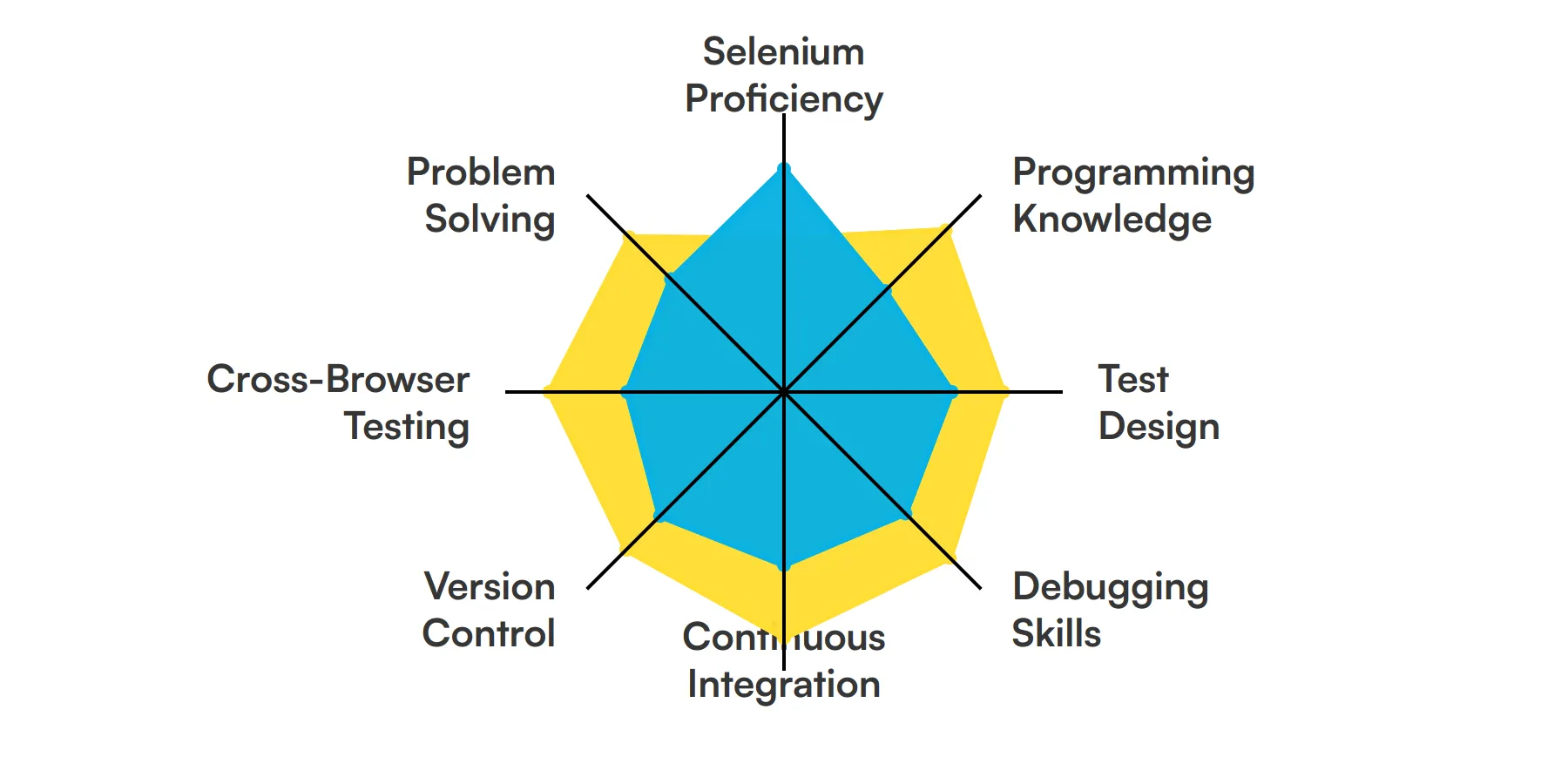
Selenium Proficiency
A Selenium Automation Tester must be adept in using Selenium tools to design and implement test automation frameworks. This skill is fundamental as it involves scripting in Selenium WebDriver to simulate user interactions with web applications, ensuring the software functions as expected across different environments.
For more insights, check out our guide to writing a Selenium Automation Tester Job Description.
Programming Knowledge
Understanding programming languages such as Java, Python, or C# is crucial for writing test scripts and automation code. A tester uses these skills to create flexible and reusable tests, which can be integrated into the development process to catch bugs early.
Test Design
Ability to design test cases and scenarios is key for a Selenium Automation Tester. This involves understanding the application's functionality and user requirements to create comprehensive test plans that cover all aspects of the application's performance and usability.
Check out our guide for a comprehensive list of interview questions.
Debugging Skills
Debugging is critical for identifying why a test failed and resolving those issues without affecting other functionalities. A tester uses these skills to ensure the reliability and stability of the software by meticulously analyzing the code and test results.
Continuous Integration
Experience with CI/CD tools like Jenkins, GitLab, or CircleCI enables a Selenium Automation Tester to integrate their test suites into the CI pipeline. This helps in automating the testing process and ensures that new code changes are viable and do not break existing functionalities.
For more insights, check out our guide to writing a Devops Engineer Job Description.
Version Control
Knowledge of version control systems such as Git is important for maintaining current and historical versions of test scripts and documentation. This skill helps in collaborating effectively with other team members, including developers and other testers.
Cross-Browser Testing
The ability to conduct tests across multiple web browsers ensures that applications perform consistently regardless of the user's browser choice. This skill is essential for a Selenium Automation Tester to guarantee a uniform user experience.
Check out our guide for a comprehensive list of interview questions.
Problem Solving
Effective problem-solving skills enable a tester to quickly identify issues and think of logical solutions to overcome them, ensuring the software development lifecycle proceeds smoothly without delays.
9 secondary Selenium Automation Tester skills and traits
The best skills for Selenium Automation Testers include Agile Methodologies, Performance Testing, Security Testing, API Testing, Database Skills, Communication, Analytical Skills, UX Understanding and Cloud Platforms.
Let’s dive into the details by examining the 9 secondary skills of a Selenium Automation Tester.
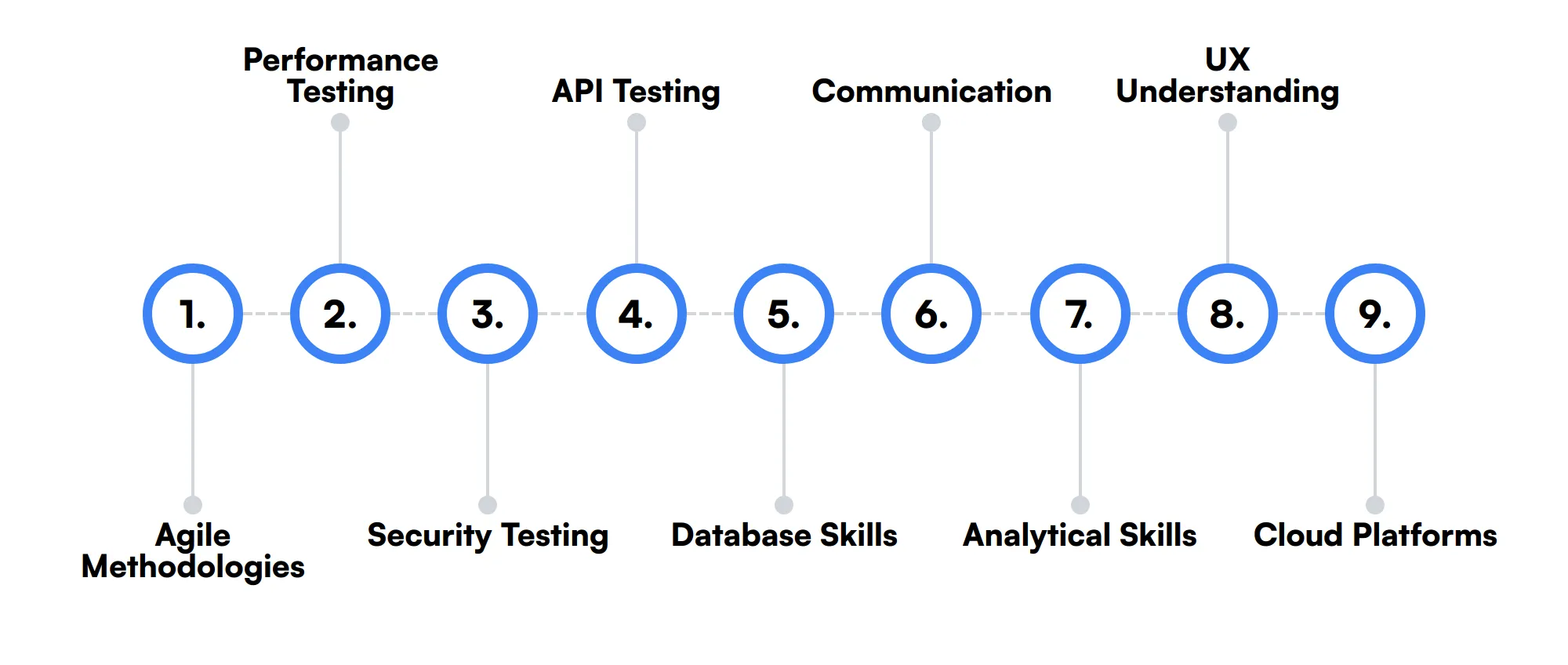
Agile Methodologies
Familiarity with Agile practices helps a tester integrate seamlessly into development teams and adapt to the rapid changes that characterize Agile projects.
Performance Testing
Understanding how to conduct performance tests to assess how the application behaves under various conditions can be a valuable skill, although not always central to the role.
Security Testing
Basic knowledge of security testing principles to check for vulnerabilities in applications can complement the core testing skills.
API Testing
Skills in API testing are beneficial for integrating and validating the interaction between different software systems, a common requirement in modern applications.
Database Skills
Ability to interact with databases using SQL for verifying data integrity and manipulating test data directly through the database.
Communication
Strong communication skills are necessary for effectively articulating test findings and collaborating with developers to resolve issues.
Analytical Skills
Being able to analyze the requirements and the impact of code changes on the application helps in creating effective test cases.
UX Understanding
A basic understanding of user experience can help in designing tests that reflect real-world usage and ensure the application is user-friendly.
Cloud Platforms
Knowledge of cloud platforms like AWS or Azure can be useful for testing applications in cloud environments, which is increasingly common.
How to assess Selenium Automation Tester skills and traits
Assessing the skills and traits of a Selenium Automation Tester involves more than just glancing at a resume. It requires a deep dive into their practical abilities across various technical domains. Understanding how to evaluate these skills effectively is key to finding the right candidate for your automation projects.
While Selenium proficiency and programming knowledge form the backbone of a tester's skill set, other aspects like test design, debugging skills, and problem-solving are equally important. Additionally, familiarity with continuous integration, version control, and cross-browser testing are indispensable for ensuring that applications perform well across all platforms and versions.
To streamline the assessment process and ensure you're evaluating candidates on the skills that matter most, consider using Adaface assessments. These tests are designed to mirror real-world tasks and can help you identify candidates with the right mix of technical prowess and problem-solving capabilities, leading to a 2x improvement in the quality of hires.
Let’s look at how to assess Selenium Automation Tester skills with these 6 talent assessments.
Selenium Online Test
Our Selenium Online Test evaluates a candidate's proficiency in using Selenium WebDriver for automation testing. This test is designed to assess their ability to interact with live websites, perform cross-browser testing using Selenium Grid, and build various testing frameworks.
The test assesses their understanding of Selenium architecture, API testing, and performance testing capabilities. It also evaluates their experience in programming, necessary for customizing and extending testing frameworks.
Successful candidates demonstrate the ability to develop comprehensive QA frameworks, effectively find issues on live sites, and generate detailed reports. This includes proficiency in data-driven and hybrid testing frameworks.
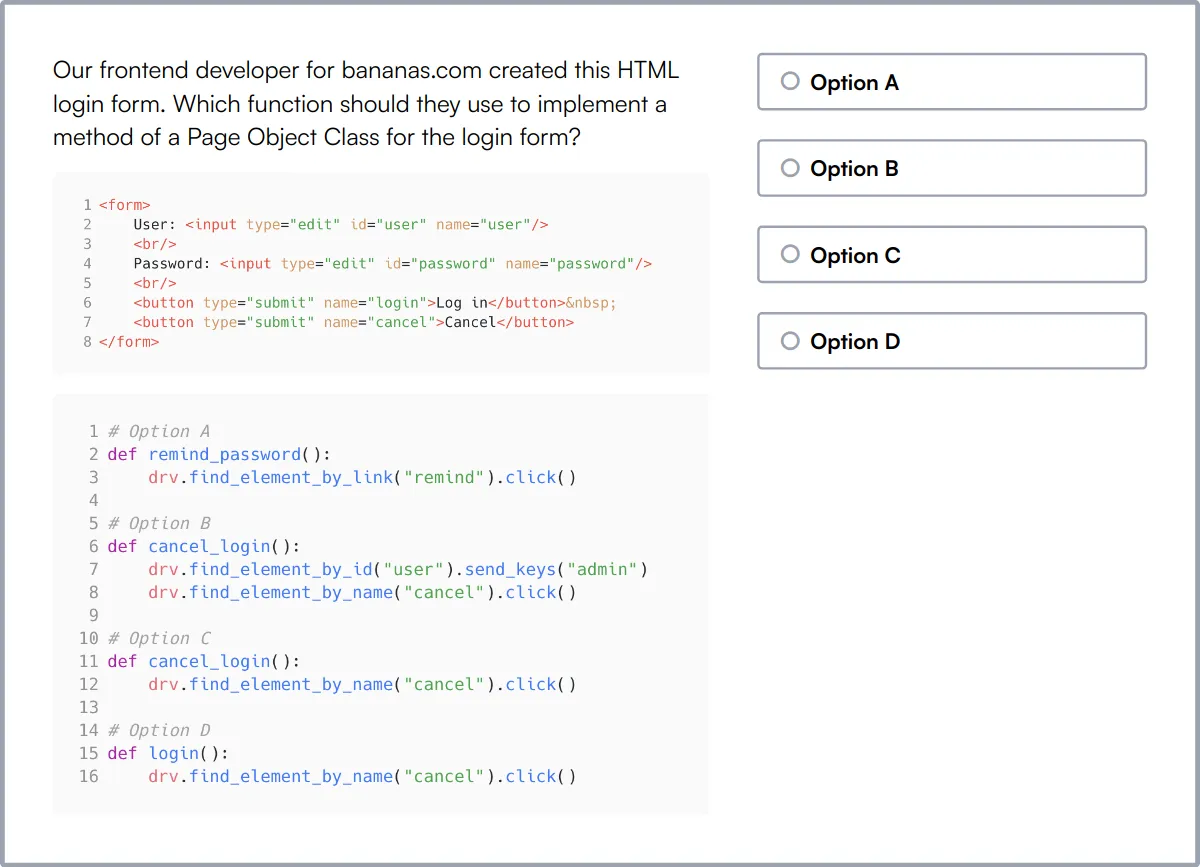
Java Online Test
Our Java Online Test gauges a candidate's knowledge of Java, covering core concepts like OOP, exception handling, and multi-threading. The test includes scenario-based questions and a coding challenge to evaluate practical Java coding skills.
This test challenges candidates with questions on Java data structures, the Collections framework, and functional programming using Lambdas & Streams API. It also touches on database interactions and SOLID principles.
Candidates who score well on this test are proficient in both foundational Java concepts and advanced features such as concurrent programming and handling relational databases.
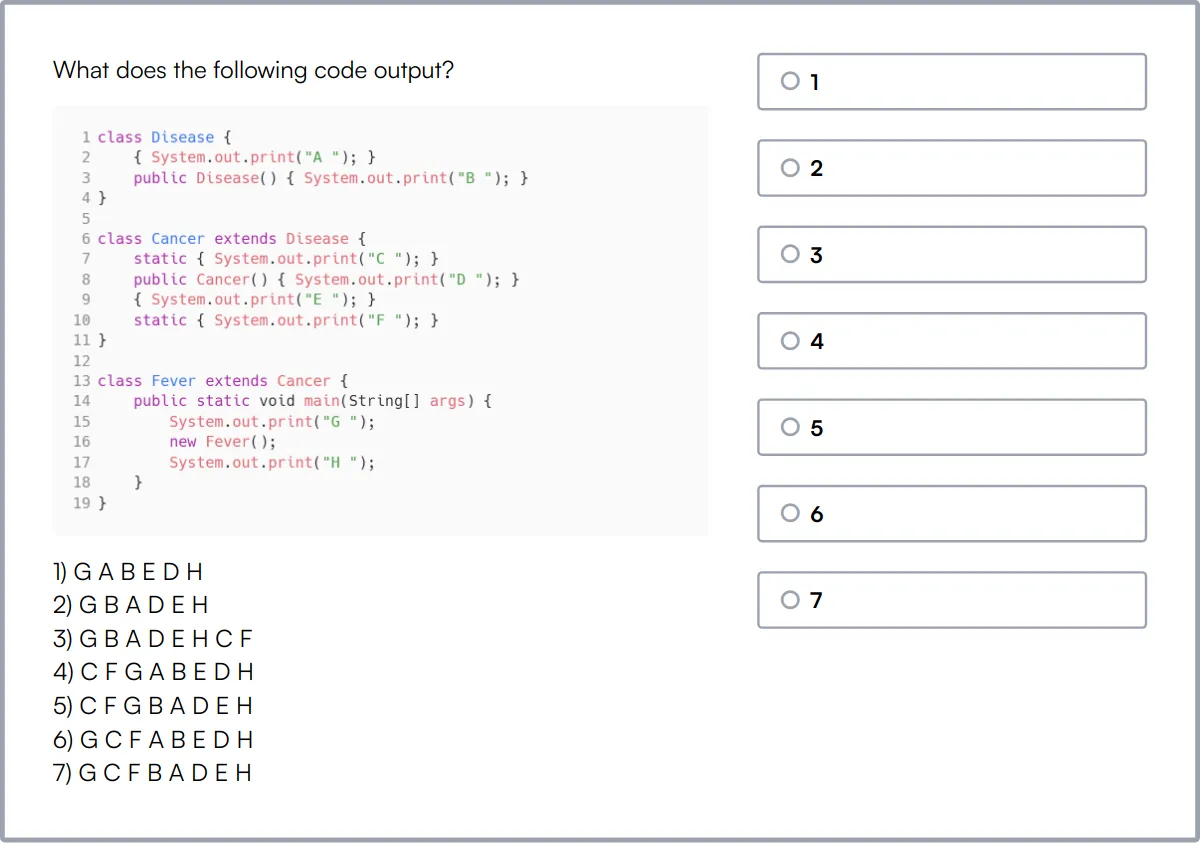
QA Engineer Test
Our QA Engineer Test assesses a candidate's understanding of Quality Assurance practices and testing fundamentals. It includes scenario-based MCQs on test design techniques, software life cycle, and Selenium fundamentals.
The test evaluates knowledge in areas such as regression testing, test reporting, documentation, and risk assessment. It also includes questions on Linux fundamentals to check the candidate's ability to work in different environments.
High-scoring individuals are adept at planning, executing, and managing comprehensive test strategies and are proficient in using automation tools like Selenium for effective testing.
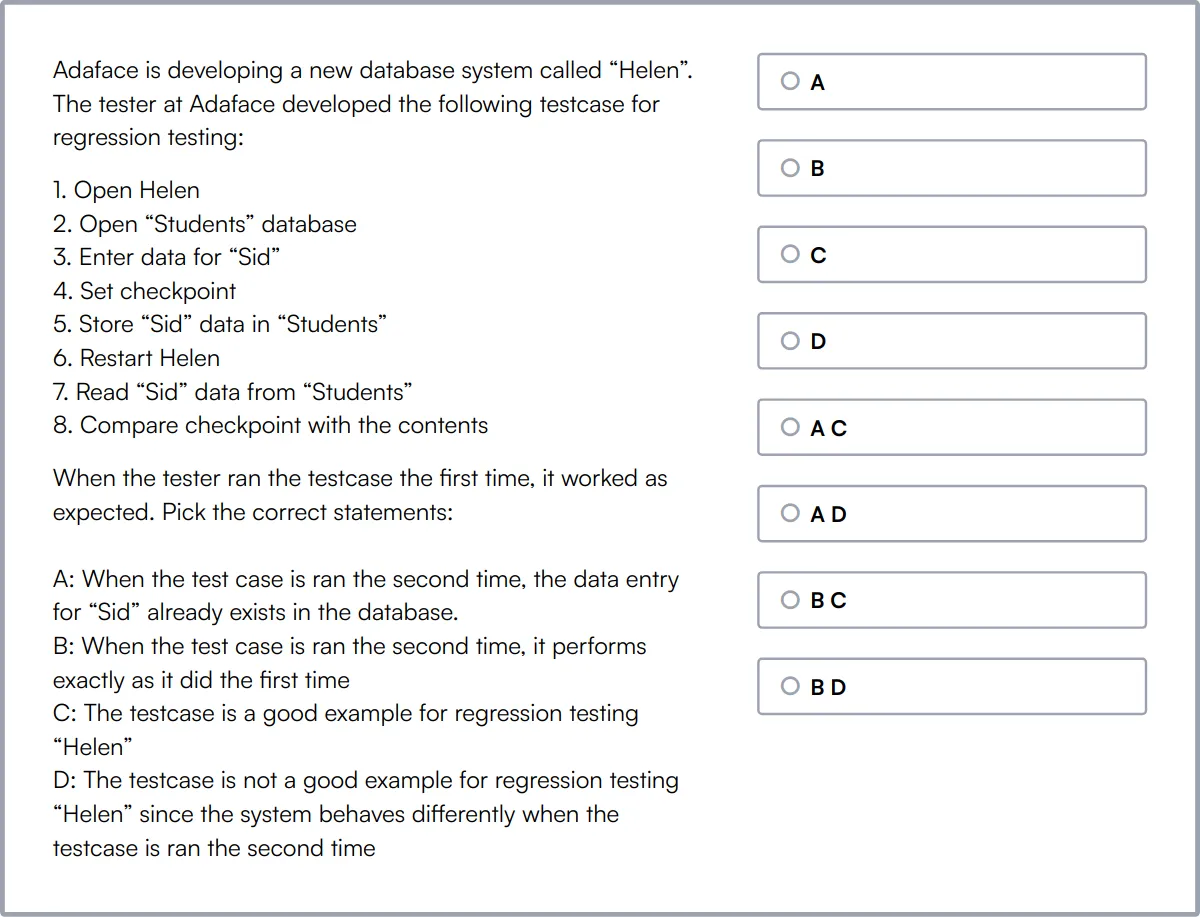
Problem Solving Test
Our Problem Solving Test evaluates a candidate's ability to analyze complex problems and devise effective solutions. The test includes questions on abstract, critical, and spatial reasoning.
Candidates are tested on their logical reasoning and data interpretation skills, essential for roles requiring analytical thinking and decision-making.
Those who excel in this test demonstrate strong problem-solving skills, with the ability to process and analyze information quickly and accurately.
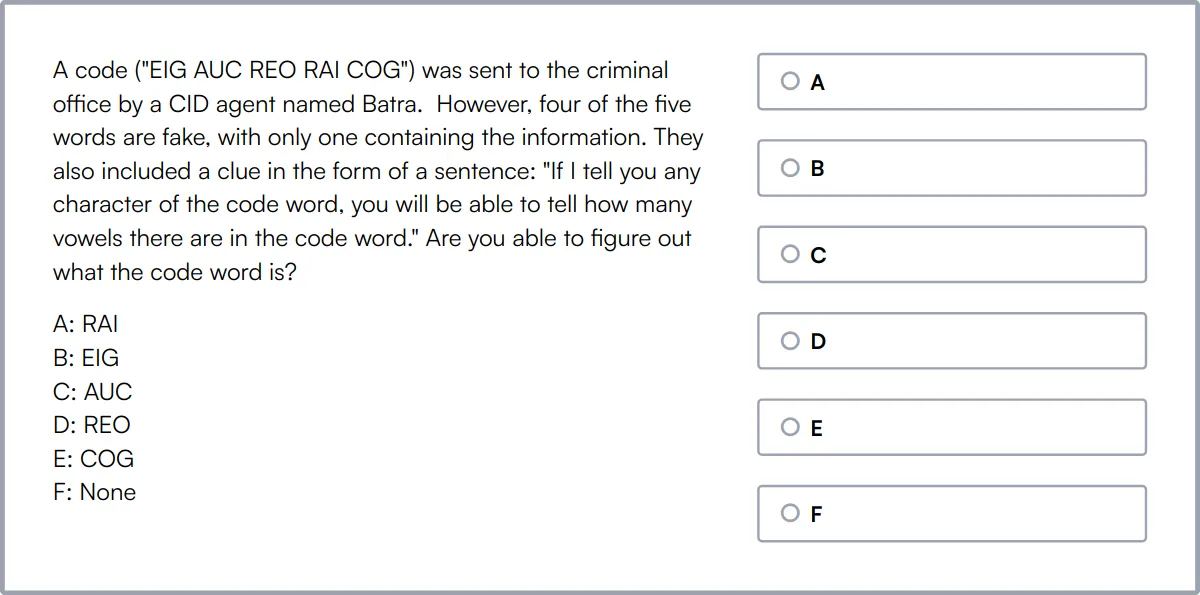
Azure DevOps Test
Our Azure DevOps Test is designed to assess a candidate's expertise in Azure and its application in DevOps practices. It covers Python scripting, Linux file system, and various Azure services like Azure Storage and Virtual Machines.
The test evaluates the candidate's understanding of cloud computing basics, infrastructure as code, and continuous integration and delivery practices within the Azure ecosystem.
Candidates proficient in these areas are well-equipped to handle DevOps roles, implementing efficient workflows and infrastructure management in cloud environments.
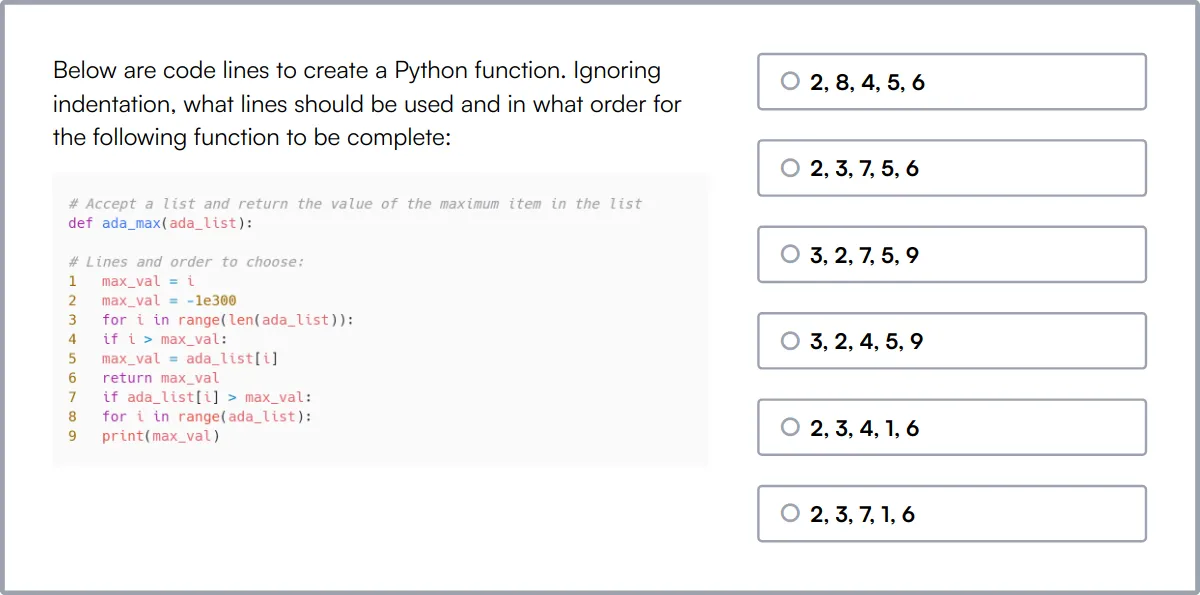
Git Online Test
Our Git Online Test assesses a candidate's knowledge of Git, focusing on repository management, branching, merging, and conflict resolution. The test is designed to evaluate practical skills in using Git for version control.
The test challenges candidates on their ability to use advanced Git features such as rebasing, managing remote repositories, and understanding Git workflows and commands.
A high score indicates a candidate's proficiency in managing source code changes effectively, an essential skill for any software development role.
Summary: The 8 key Selenium Automation Tester skills and how to test for them
| Selenium Automation Tester skill | How to assess them |
|---|---|
| 1. Selenium Proficiency | Evaluate a candidate's ability to automate web applications using Selenium. |
| 2. Programming Knowledge | Assess understanding and application of programming languages relevant to the project. |
| 3. Test Design | Check ability to design comprehensive, effective, and scalable test cases. |
| 4. Debugging Skills | Determine skill in identifying and resolving software bugs and issues. |
| 5. Continuous Integration | Review experience with tools and practices for continuous integration. |
| 6. Version Control | Examine familiarity with version control systems like Git. |
| 7. Cross-Browser Testing | Assess ability to ensure consistent behavior across multiple browsers. |
| 8. Problem Solving | Evaluate how effectively a candidate approaches and solves complex problems. |
Selenium Online Test
Selenium Automation Tester skills FAQs
What is Selenium Proficiency and why is it important for an Automation Tester?
Selenium Proficiency refers to the ability to effectively use the Selenium suite of tools for automating web applications. It is important because it allows testers to create, execute, and manage automated test scripts, ensuring the software works as expected.
How can recruiters assess a candidate's Programming Knowledge?
Recruiters can assess Programming Knowledge by asking candidates to solve coding problems, review their past projects, or conduct technical interviews focusing on languages like Java, Python, or C# commonly used with Selenium.
What are some key aspects of Test Design that candidates should know?
Candidates should understand how to create test plans, design test cases, and develop test scripts. They should also be familiar with different testing techniques like boundary value analysis and equivalence partitioning.
Why are Debugging Skills important in Selenium Automation Testing?
Debugging Skills are important because they help testers identify, analyze, and fix issues in the test scripts or the application under test, ensuring the tests run smoothly and accurately.
What role does Continuous Integration play in Selenium Automation Testing?
Continuous Integration (CI) involves automatically running tests as part of the build process. It helps in early detection of defects, ensuring that the code changes do not break the existing functionality.
How can recruiters evaluate a candidate's experience with Version Control systems?
Recruiters can evaluate this by asking about the candidate's experience with tools like Git, their understanding of branching and merging strategies, and their ability to manage code repositories.
What is Cross-Browser Testing and why is it necessary?
Cross-Browser Testing ensures that web applications work correctly across different browsers and devices. It is necessary to provide a consistent user experience regardless of the browser or device used.
How can Problem Solving skills be assessed in a Selenium Automation Tester?
Problem Solving skills can be assessed by presenting candidates with real-world testing scenarios or challenges and asking them to outline their approach to identifying and resolving issues.

40 min skill tests.
No trick questions.
Accurate shortlisting.
We make it easy for you to find the best candidates in your pipeline with a 40 min skills test.
Try for freeRelated posts
Free resources



